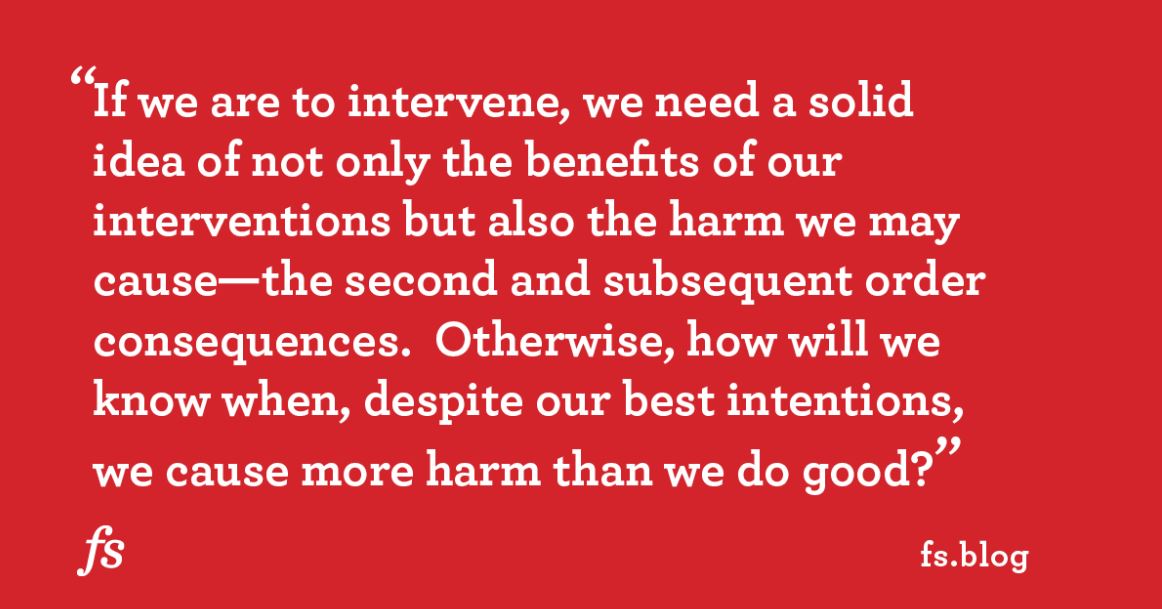Iatrogenics - Do Something Syndrome
Intervention Bias
When to Step in and When To Leave Things Alone
Iatrogenics - Overview
Iatrogenics is a term, drawn from the medical world but now used generically, that refers
to any effect resulting from an intervention that causes more harm than gain.
The term is derived from the Greek word "iatros" which means healer and it means “caused by the healer” or “brought by the healer.”
Closely related to this is "The Action Bias" which describes a standard human response in
situations where the best decision is not clear, and the automatic
response is to do something.
We see iatrogenics occurring in the world of politics. The most notable and infamous example of this was the US Government's decisions [fully supported by the UK Government] to launch military actions in Iraq and Afghanistan.
Every time a social injustice is reported in the media, this is invariably followed by "calls" [aka demands] for action.
At
time of writing, here in the UK there is currently a big media focus on
what has been termed "the rape culture" which is allegedly prevalent in
UK secondary schools [pupils in the age range 11-18] and there have
been calls for action.
In the world of business this is also very common and occurs regularly when a new CEO or senior management team take over.
In most of these situations the intentions are positive, and in some cases even honourable and well meant, and the solutions offered might address the immediate [or first-order] presenting issues.
But, all too often, little to no thought has been given to the second and subsequent order consequences [the "knock on effects"] and the end result is that the actions
initiated [as so disastrously illustrated with the US interventions in
Irag and Afghanistan] cause considerably more harm than the problem
they were intended to solve.
A difficulty with iatrogenics is that
the negative effects are delayed, or could
be explained by multiple causes, and thus it all to easy for the present
political or business leader to claim that "it didn't happen on my watch".
Intervening
when you have no idea of the "break-even" point, where the gain is at
least equal to the harm caused, has been described by Nassim
Taleb as “naive
interventionism.”
“Failing to consider
second, and third-order consequences is the cause of a lot of painfully
bad decisions, and it is especially deadly when the first inferior
option confirms your own biases. Never seize on the first available
option, no matter how good it seems, before you’ve asked questions and
explored.” [Ray Dalio]
Iatrogenics - Why Do Something When Intervention Often Leads to Worse Outcomes?
The
overarching drivers that can cause iatrogenics and an action bias are generally thought to be evolutionarily adaptive and thus hardwired in us as a means of survival.
Here are six specific reasons why you will follow that impulse and intervene:
- Overconfidence in your ability to predict a favorable outcome.
- Your desire to feel in control over
your circumstances.
- Failure to realize that the second and subsequent order consequences exist at all or could outweigh the benefits.
- Distance from the consequences - when there is a time delay between an action and its consequences
(feedback) it can be hard to know that you’re causing harm.
- Wanting to be seen to be doing something. Societal, political and business pressures and the associated expectations make it hard for you to say, “I don’t know.”
- Incentives. If you have little to no skin in the game. You win if things go right and suffer no consequences if things go wrong.
How to avoid Iatrogenics
- Understand and recognise your impulse to react automatically. A mindful approach will help you do this.
- Then, instead of reacting automatically, you consider carefully the consequences of both action and inaction and compare their effectiveness.
- Until you have a reasonable measure of clarity about the second and subsequent order consequences you should remain inactive.
Return from "Iatrogenics" to: Mental Models
LATEST ARTICLES
Master The Season You Are In - The Key to Fulfilling Your Purpose
 To fulfil your purpose, you must first master the season you are in. One of the biggest mistakes you can make in life is focusing all your energy on the next season instead of learning to master the s…
To fulfil your purpose, you must first master the season you are in. One of the biggest mistakes you can make in life is focusing all your energy on the next season instead of learning to master the s…The Inner Weight of Shame - Sustained By Attentional Fixation
 A Mind That Is Continuously Engaged In Self-Surveillance. Shame is one of the heaviest inner burdens a human being can carry. It does not announce itself loudly or demand attention through drama. Inst…
A Mind That Is Continuously Engaged In Self-Surveillance. Shame is one of the heaviest inner burdens a human being can carry. It does not announce itself loudly or demand attention through drama. Inst…Does Prayer Work? The Psychology of Prayer, Meditation and Outcomes
 Reality Is A Complex System Of Countless Interactions - Including Yours. So does prayer work? The problem is that the question itself is usually framed in a way that guarantees confusion. We tend to a…
Reality Is A Complex System Of Countless Interactions - Including Yours. So does prayer work? The problem is that the question itself is usually framed in a way that guarantees confusion. We tend to a…Living in Survival Mode Without Surrendering Mental Authority
Living in Survival Mode Without Surrendering Mental Authority
 Clear Thinking When You’re Just Trying to Stay Afloat. Many people today are overwhelmed because they are living in survival mode - not temporarily, but as a persistent condition of life. For many, th…
Clear Thinking When You’re Just Trying to Stay Afloat. Many people today are overwhelmed because they are living in survival mode - not temporarily, but as a persistent condition of life. For many, th…Manifestation Without Magic: A Practical Model
 Manifestation without magic is not a softer or more intellectual version of popular manifestation culture. It is a different model altogether. Popular manifestation teachings tend to frame reality as…
Manifestation without magic is not a softer or more intellectual version of popular manifestation culture. It is a different model altogether. Popular manifestation teachings tend to frame reality as…Staying Committed When You Can't See Progress - The Psychology of Grit
 Uncertainty Is Not The Absence Of Progress, Only The Absence Of Reassurance. One of the most destabilising experiences in modern life is not failure, but uncertainty and staying committed when you can…
Uncertainty Is Not The Absence Of Progress, Only The Absence Of Reassurance. One of the most destabilising experiences in modern life is not failure, but uncertainty and staying committed when you can…The Battle For Your Mind - How To Win Inner Freedom In A Digital Age Of Distraction
 From External Events to Inner Events. We often think of “events” as things that happen out there: the traffic jam, the rude comment, the delayed email reply. But what truly shapes our experience is wh…
From External Events to Inner Events. We often think of “events” as things that happen out there: the traffic jam, the rude comment, the delayed email reply. But what truly shapes our experience is wh…How to See Your Thoughts Without Becoming the Story
 A Practical Guide to Thought-Awareness. You can spend your life inside the stories of your mind without ever learning how to see your thoughts clearly and objectively. Most of the stuff we tell oursel…
A Practical Guide to Thought-Awareness. You can spend your life inside the stories of your mind without ever learning how to see your thoughts clearly and objectively. Most of the stuff we tell oursel…The Collison Decision Matrix - A Simple Framework for Better Choices
 The Collison Decision Matrix Is A Practical Everyday Thinking Tool. Most of us spend a surprising amount of time worrying about decisions. From small ones such as what to wear, what to eat, what to te…
The Collison Decision Matrix Is A Practical Everyday Thinking Tool. Most of us spend a surprising amount of time worrying about decisions. From small ones such as what to wear, what to eat, what to te…The Power Of Asking The Right Question
 The Power Of Asking The Right Question Lies In The Quest For Insight. To experience the power of asking the right question you must develop the practice of asking questions. The best way to improve th…
The Power Of Asking The Right Question Lies In The Quest For Insight. To experience the power of asking the right question you must develop the practice of asking questions. The best way to improve th…Site Pathways
 Here is a site pathway to help new readers of Zen-Tools navigate the material on this site. Each pathway is based around one of the many key themes covered on this site and contain a 150 word introduc…
Here is a site pathway to help new readers of Zen-Tools navigate the material on this site. Each pathway is based around one of the many key themes covered on this site and contain a 150 word introduc…
